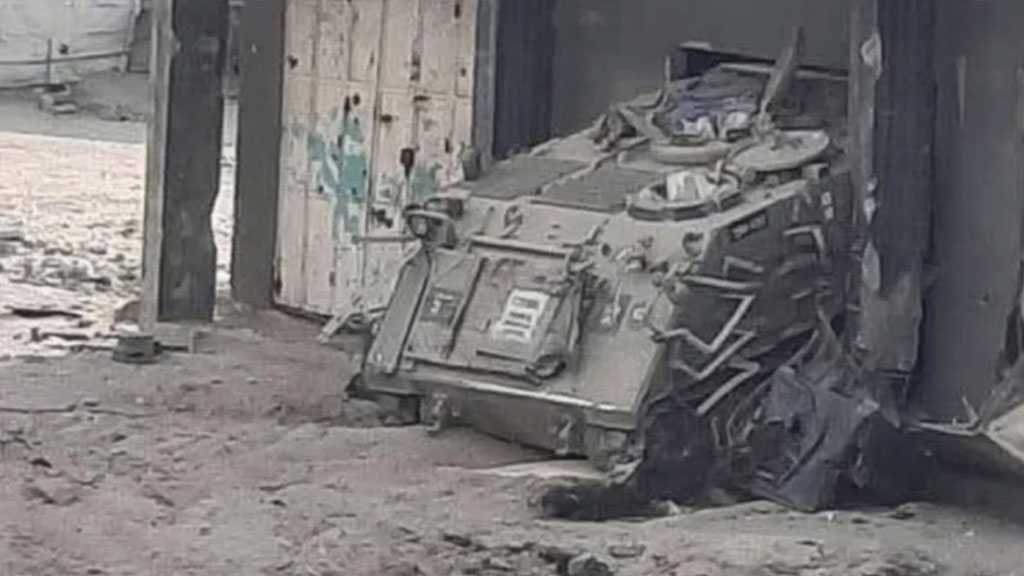"Israel’s" recipe for crime without punishment

Source: Daily Star, 06-10-2008
By Marc J. Sirois
For those who wonder why 'Israel' has experienced so much trouble "fitting in" in the Middle East, and why it routinely gets away with mass murder, it is periodically helpful to be reminded.
Witness the highly disturbing pronouncements made on Friday by one Gadi Eisenkot, the general who runs 'Israel's' Northern Command. Eisenkot's obvious goal was to intimidate and terrorize Lebanese civilians by threatening to punish them during any future conflict with Hizbullah. And as a bonus, the Western media coverage of his vile threats offered a free demonstration of how and why the Zionist project has always enjoyed blanket impunity for the war crimes it commits - and even acknowledges - on what, in historical terms, has been a regular basis.
"What happened in Dahiyeh [the suburbs south of Beirut where Hizbullah enjoys strong popular support] in 2006 will happen in every village from which 'Israel' is fired on," Eisenkot said in an interview with the Yediot Ahronot daily, excerpts of which were carried by Western news agencies. "We will apply disproportionate force on [such villages] and cause great damage and destruction there. From our standpoint, these are not civilian villages, they are military bases."
"This is not a recommendation," the general added. "This is a plan. And it has been approved."
Where to begin?
First off, Eisenkot's recollection of the 2006 war is more than a little hazy, and the fact that he was appointed to the Northern Command job only after the fighting was over is no excuse. His warning is predicated on the wholly fatuous notion that villages in South Lebanon were somehow spared during that conflict - when anyone who saw that part of the country afterward knows full well that in relative terms, dozens of communities there were damaged every bit as badly as the Dahiyeh. Some of them, in fact, were devastated far more thoroughly than any but a few blocks in Haret Hreik, the Dahiyeh sector generally assumed to host the highest concentration of individuals and organizations connected to the resistance.
It is nothing short of preposterous to suggest, as Eisenkot did, that 'Israeli' forces did not target villages from which they received fire in 2006, especially since they obviously had no qualms about ravaging ones from which they did not. As an aside, this raises the still-popular smear that Hizbullah systematically used civilians and their property as "cover" in the hope that rockets could be launched without fear of retaliation. While there were instances where the resistance fired from residential areas, the idea that its members would do so in hopes of staying an 'Israeli' trigger finger (and not because of tactical necessities) would require that this sort of hesitance had been displayed with some degree of regularity in the past. Patently, it has not, and no one knows this better than Hizbullah fighters do.
During repeated visits to the South in 2006, I saw hundreds of circular scorches marking the sites from which Katyushas or other crude missiles had been launched toward 'Israel' from hillsides and fields far from any homes; not a single one had been subjected to counter-battery fire. The odd ones still visible near built-up areas, on the other hand, were uniformly surrounded by scenes of utter ruin caused by air and artillery strikes.
Second, we have the question of disproportionality. 'Israeli' officials doggedly denied the charge in 2006, even though they slaughtered more than a 1,000 civilians, including hundreds of women and children, and wrecked tens of thousands of homes in response to a relatively minor border incident. It will be difficult for them to make a similar argument in the future because Eisenkot has now openly stated that the next time, 'Israel' "will apply disproportionate force" (as though that were not the case the last time). If nothing else, credit the son of a bitch for quasi-honesty on this score.
Third, there is the matter of premeditation. Even if one ignores all the facts and grants the benefit of the doubt to 'Israeli' political leaders and military commanders in 2006 by allowing for the possibility that they did not deliberately target civilians - and therefore for the possibility that fouling farmers' fields with cluster bombs and trying to starve 4 million people do not constitute the war crime known as collective punishment - that will not be possible if and when they commence a new orgy of bloodletting and destruction. Why? Because the officer in charge of Northern Command has clearly articulated what has been 'Israeli' policy for generations: Arabs are not entitled to the same protections as other civilians, and his desire to make them pay for the activities of combatants "is not a recommendation. It is a plan. And it has been approved."
Perhaps Eisenkot will be replaced before there is another round of hostilities; the plan, presumably, will remain firmly in place.
And how did the Western media report the general's criminal threats? The headlines of the three main wire services tell that story (although not the one that they should have dealt with):
"'Israeli' general warns Hizbullah of harsh response," "'Israel' warns Hizbullah war would invite destruction" and "'Israel' general warns Hizbullah of harsh riposte." Nothing about the people Eisenkot was openly threatening: They, it seems, do not count.
This is why his threats stand a very good chance of being made good upon if and when 'Israel' and Hizbullah come to blows again: The 'Israelis' are not held to account for their atrocities, even when they go to the trouble of announcing them ahead of time.
By Marc J. Sirois
For those who wonder why 'Israel' has experienced so much trouble "fitting in" in the Middle East, and why it routinely gets away with mass murder, it is periodically helpful to be reminded.
Witness the highly disturbing pronouncements made on Friday by one Gadi Eisenkot, the general who runs 'Israel's' Northern Command. Eisenkot's obvious goal was to intimidate and terrorize Lebanese civilians by threatening to punish them during any future conflict with Hizbullah. And as a bonus, the Western media coverage of his vile threats offered a free demonstration of how and why the Zionist project has always enjoyed blanket impunity for the war crimes it commits - and even acknowledges - on what, in historical terms, has been a regular basis.
"What happened in Dahiyeh [the suburbs south of Beirut where Hizbullah enjoys strong popular support] in 2006 will happen in every village from which 'Israel' is fired on," Eisenkot said in an interview with the Yediot Ahronot daily, excerpts of which were carried by Western news agencies. "We will apply disproportionate force on [such villages] and cause great damage and destruction there. From our standpoint, these are not civilian villages, they are military bases."
"This is not a recommendation," the general added. "This is a plan. And it has been approved."
Where to begin?
First off, Eisenkot's recollection of the 2006 war is more than a little hazy, and the fact that he was appointed to the Northern Command job only after the fighting was over is no excuse. His warning is predicated on the wholly fatuous notion that villages in South Lebanon were somehow spared during that conflict - when anyone who saw that part of the country afterward knows full well that in relative terms, dozens of communities there were damaged every bit as badly as the Dahiyeh. Some of them, in fact, were devastated far more thoroughly than any but a few blocks in Haret Hreik, the Dahiyeh sector generally assumed to host the highest concentration of individuals and organizations connected to the resistance.
It is nothing short of preposterous to suggest, as Eisenkot did, that 'Israeli' forces did not target villages from which they received fire in 2006, especially since they obviously had no qualms about ravaging ones from which they did not. As an aside, this raises the still-popular smear that Hizbullah systematically used civilians and their property as "cover" in the hope that rockets could be launched without fear of retaliation. While there were instances where the resistance fired from residential areas, the idea that its members would do so in hopes of staying an 'Israeli' trigger finger (and not because of tactical necessities) would require that this sort of hesitance had been displayed with some degree of regularity in the past. Patently, it has not, and no one knows this better than Hizbullah fighters do.
During repeated visits to the South in 2006, I saw hundreds of circular scorches marking the sites from which Katyushas or other crude missiles had been launched toward 'Israel' from hillsides and fields far from any homes; not a single one had been subjected to counter-battery fire. The odd ones still visible near built-up areas, on the other hand, were uniformly surrounded by scenes of utter ruin caused by air and artillery strikes.
Second, we have the question of disproportionality. 'Israeli' officials doggedly denied the charge in 2006, even though they slaughtered more than a 1,000 civilians, including hundreds of women and children, and wrecked tens of thousands of homes in response to a relatively minor border incident. It will be difficult for them to make a similar argument in the future because Eisenkot has now openly stated that the next time, 'Israel' "will apply disproportionate force" (as though that were not the case the last time). If nothing else, credit the son of a bitch for quasi-honesty on this score.
Third, there is the matter of premeditation. Even if one ignores all the facts and grants the benefit of the doubt to 'Israeli' political leaders and military commanders in 2006 by allowing for the possibility that they did not deliberately target civilians - and therefore for the possibility that fouling farmers' fields with cluster bombs and trying to starve 4 million people do not constitute the war crime known as collective punishment - that will not be possible if and when they commence a new orgy of bloodletting and destruction. Why? Because the officer in charge of Northern Command has clearly articulated what has been 'Israeli' policy for generations: Arabs are not entitled to the same protections as other civilians, and his desire to make them pay for the activities of combatants "is not a recommendation. It is a plan. And it has been approved."
Perhaps Eisenkot will be replaced before there is another round of hostilities; the plan, presumably, will remain firmly in place.
And how did the Western media report the general's criminal threats? The headlines of the three main wire services tell that story (although not the one that they should have dealt with):
"'Israeli' general warns Hizbullah of harsh response," "'Israel' warns Hizbullah war would invite destruction" and "'Israel' general warns Hizbullah of harsh riposte." Nothing about the people Eisenkot was openly threatening: They, it seems, do not count.
This is why his threats stand a very good chance of being made good upon if and when 'Israel' and Hizbullah come to blows again: The 'Israelis' are not held to account for their atrocities, even when they go to the trouble of announcing them ahead of time.




